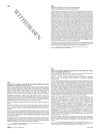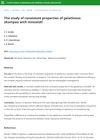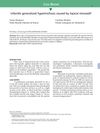 1 citations,
April 2016 in “Journal of The American Academy of Dermatology”
1 citations,
April 2016 in “Journal of The American Academy of Dermatology” The study concludes that Loose Anagen Hair Syndrome is a benign condition that usually improves with age but can be hard to diagnose and stressful for the family.
 March 2016 in “Aktualʹnì pitannâ farmacevtičnoï ì medičnoï nauki ta praktiki”
March 2016 in “Aktualʹnì pitannâ farmacevtičnoï ì medičnoï nauki ta praktiki” The shampoo with minoxidil maintains its consistency well and spreads evenly on the scalp.
 July 2024 in “Pharmaceutical Development and Technology”
July 2024 in “Pharmaceutical Development and Technology” Microsponges with rosemary oil significantly improve hair growth compared to regular rosemary oil and minoxidil.
 February 2019 in “Case medical research”
February 2019 in “Case medical research” Using lasers to deliver minoxidil can potentially improve its effectiveness in treating male pattern hair loss.
Sansevieria trifasciata Prain shows promise for treating hair loss by inhibiting androgen receptors.
July 2022 in “Journal of Investigative Dermatology” Combining Low Level Light Therapy and minoxidil may help with hair growth, but more research is needed.
November 2022 in “Research Square (Research Square)” Topical minoxidil 5% is better for treating female pattern hair loss than topical sildenafil 1%.
 7 citations,
February 2021 in “Dermatologic Therapy”
7 citations,
February 2021 in “Dermatologic Therapy” Sebaceous glands are involved in various skin disorders, some treatable with medications like finasteride and minoxidil.

The document concludes that hair loss in women can be caused by various factors and is managed with specific treatments like medication, therapy, and lifestyle changes.
 10 citations,
February 2016 in “Anais Brasileiros de Dermatologia”
10 citations,
February 2016 in “Anais Brasileiros de Dermatologia” Topical minoxidil can cause excessive hair growth in children, so use it carefully.







